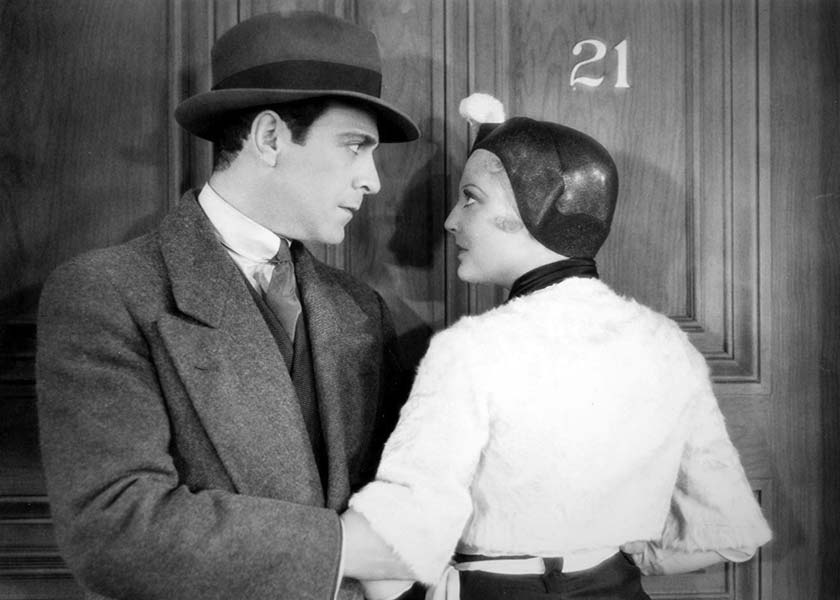Synopsis
Ruth Wonderly (Daniels) hires the private detective firm of Spade (Cortez) and Archer (Walter Long) to follow a man named Floyd Thursby who should lead them to her runaway sister. Archer takes the job and is murdered the first night. A few days later, Thursby is also murdered. The police suspect Spade of both murders. A man named Joel Cairo (Otto Matieson) visits Spade's office and tells him that Archer's death is related to the hunt for a valuable statue known as the Maltese Falcon. He offers a substantial reward for finding the statue. Ruth's story about her sister was a lie, and she comes to Spade looking for protection from her former confederates who are searching for the statue. Sam visits one of these confederates, Caspar Gutman (Digges), who tells him the history of the statue. Cairo comes of visit Gutman and tells him that the statue is on a boat arriving from China. Ruth had arranged with the captain of the boat to bring the statue to her. Gutman drugs Spade, and he and Cairo head to the docks in search of the statue.
Later, the dying Captain Jacobi brings the statue to Spade's office. Spade hides the statue and takes Ruth to his apartment. Cairo, Gutman and Wilmer (Dwight Frye), Gutman's psychotic henchman, are waiting for him. After negotiating with Gutman for a payoff and for a fall guy (who they agree will be Wilmer) to take the rap for the murders of Thorsby and Jacobi, Sam agrees to give them the Maltese Falcon. Sam's secretary Effie (Merkel) retrieves it and brings it to him. Gutman, Cairo and Ruth eagerly gather around the statue but are disappointed to find that it is a phony. Meanwhile, Wilmer flees through a window. Gutman and Cairo leave to continue their pursuit of the statue. Sam notifies the police. Awaiting the police, Spade tells Ruth that he loves her, but so what, she killed Archer, and she must take the fall for it. He will not play the sap for her. The police arrive and inform Sam that Wilmer has killed Gutman. Sam turns Ruth over to them. At her trial, Ruth is identified by an eyewitness. Ultimately, Sam is given a political appointment.
Discussion
Although not as solidly played or tightly written as the 1941 version with Humphrey Bogart, this version Dashiell Hammett's The Maltese Falcon has vitality, great character interactions, and a few excellent performances. It is well worth watching. Ricardo Cortez's Spade is dynamic, good-looking, engaging, and sleazy. Bebe Daniels is alluring as Ruth Wonderly, alternating between pleading with Spade, enticing him, or conniving against him. Dudley Diggs is persuasive and oily as Gutman. Hammett's novel was originally serialized in the magazine Black Mask from September 1929 to January 1930, not long before this first film version.
The Maltese Falcon showcases the risqué plot lines, amoral characters, and fast paced, snappy dialogue typical of Warner Bros. films in the Pre-Code era. The sexual responsiveness among the characters is candidly portrayed. As the film begins, the woman-chasing Spade has obviously been making love to a woman in his office, and he freely paws his secretary Effie and ogles Ruth Wonderly. The homosexual relationship of Gutman and Wilmer is also obvious.
The Maltese Falconshowcases the risqué plot lines, amoral characters, and fast paced, snappy dialogue typical of Warner Bros. films in the Pre-Code era, which was the period between establishment and enforcement of the Motion Picture Production Code. Adopted by the Motion Picture Producers and Distributors of America (MPPDA) in 1930, the Code was a set of moral guidelines meant to restrict profane, blasphemous, violent, sexual and otherwise cynical content from being shown in films. Initially, motion picture producers followed the code on a voluntary basis. In 1934, the MPPDA established an enforcement office, the Production Code Administration, which issued certificates of approval, and by mid-1934 the Code was being strictly enforced. Films made during the lax Pre-Code era of 1930 to mid-1934, such as The Bachelor Father, Blondie of the Follies, Employee's Entrance, Hat Check Girl, A House Divided, The Kiss Before the Mirror, Ladies They Talk About, Laughter in Hell, Safe in Hell, She Had to Say Yes and Ten Cents a Dance, often contain sexual references, violent events, and levels of cynicism that would have been forbidden or, at minimum, greatly softened, until the Code's influence finally waned in the late 1950s.
Further Reading

